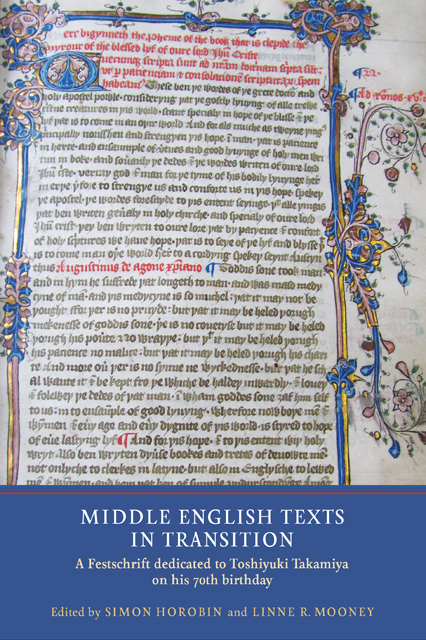 Middle English Texts in Transition
Middle English Texts in Transition Published online by Cambridge University Press: 11 March 2023
More than half a century ago Ethel Seaton speculated that Le Songe Vert, a little-known poem in French, ‘with all its pretty circumstances, its charmingly maternal Venus, its mystic lily, its modulations from black into the key of green’, deserved a wider and more receptive readership than just the two disdainful Frenchmen who alone, until Seaton herself, had noted the poem at all – especially since, in Seaton’s view, the unnamed poet was probably John Gower. Despite her high opinion of the poem’s merits, however, Seaton’s clarion seems to have thudded on deaf ears, and to have remained there. No one to my knowledge – not writing in English, at any rate – has heeded her call to read and appreciate Le Songe Vert, let alone think seriously about a date and an author. Working through a potentially important text in two relatively obscure but significant manuscripts seems a challenge that my esteemed friend Professor Takamiya might take up. I therefore offer what follows, with all humble respect, in his honour.
Le Songe Vert is a dream-vision of approximately 1,822 lines, in octosyllabic couplets. The ‘pretty circumstances’ noted by Seaton are many, and intricately interworked; but in essence the outline is as follows. There has been a plague from which a great number of people – including the narrator’s beloved – have died, and the narrator consequently wears black, a colour convenient to his mood as well. Seeking solace at Easter, he follows a river into an orchard where, overcome with grief, he faints. In his swoon he meets Venus, attended by two knights (Désir and Bon Espoir) and two ladies (Loiauté and Plaisance). Venus argues that it is time to take a new love, one she has selected for him and describes in detail. This lady seems familiar to him, and he protests, out of devotion to his dead beloved, but also because he believes this new lady would never love him. He faints again. Venus rouses him, Désir borrows a conserve called ‘Restorant’ from Merci and gives him five portions, which rouses him further. Venus shows him a vision of a/the beautiful lady, and while he stands amazed, he is stripped of his black clothes and dressed in green robes edged in blue, with a blue silk girdle and a hood stitched in golden hair.
To save this book to your Kindle, first ensure [email protected] is added to your Approved Personal Document E-mail List under your Personal Document Settings on the Manage Your Content and Devices page of your Amazon account. Then enter the ‘name’ part of your Kindle email address below. Find out more about saving to your Kindle.
Note you can select to save to either the @free.kindle.com or @kindle.com variations. ‘@free.kindle.com’ emails are free but can only be saved to your device when it is connected to wi-fi. ‘@kindle.com’ emails can be delivered even when you are not connected to wi-fi, but note that service fees apply.
Find out more about the Kindle Personal Document Service.
To save content items to your account, please confirm that you agree to abide by our usage policies. If this is the first time you use this feature, you will be asked to authorise Cambridge Core to connect with your account. Find out more about saving content to Dropbox.
To save content items to your account, please confirm that you agree to abide by our usage policies. If this is the first time you use this feature, you will be asked to authorise Cambridge Core to connect with your account. Find out more about saving content to Google Drive.